
Sorbonne University is a public research university located in Paris, France. The institution's legacy reaches back to 1257 when Sorbonne College was established by Robert de Sorbon as one of the first universities in Europe.

Île-de-France tramway Line 1 is part of the modern tram network of the Île-de-France region of France. Line T1 connects Noisy-le-Sec station and Asnières-sur-Seine with a suburban alignment running in parallel to the Northern city limits of Paris. The line has a length of 17 km (11 mi) and 36 stations. It opened in 1992 as the first modern tram line in the Paris region. The line was extended in December 2003 and November 2012.

Pierre Laconte, is a Belgian urbanist. He specialises in urban transport and architectural planning and environmental issues.
Jacques Fradin is a physician and cognitive and behavioural therapist. He is working on developing a neuroscientific approach of the cognitive and behavioural therapy (CBT): the neurocognitive and behavioural therapy. He founded the Institute of Environmental Medicine in 1987 where he is managing a team of researchers and PhD students in cognitive and behavioural neurosciences in collaboration with Paris 8 University and the IRBA. Dpt. A.C.S.O. Fradin is an APM and PUCA expert.
Jean Renaudie was a French architect and town-planner.
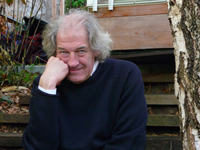
Alexandre Chemetoff is a French architect, urban planner and landscape artist. In 2000, he was awarded the Grand Prix de l'urbanisme. His approach to project development is to visit the site, walk it, and then connect it with other experiences.
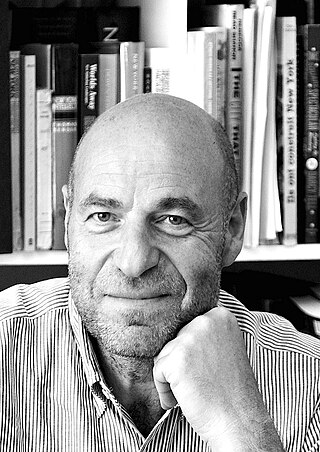
Jean-Louis Cohen is a French architect and architectural historian specializing in modern architecture and city planning. Since 1994 he has been the Sheldon H. Solow Professor in the History of Architecture at New York University Institute of Fine Arts.
IATEUR is a teaching and research unit of the University of Reims. It was founded in 1971 by Roger Brunet, then a professor of geography. IATEUR combines three major foci: planning, development and environment in order to provide a framework for sustainable urbanisation and heritage preservation.
The French Institute of Urbanism was a French scientific research institute that provided post-graduate training in the fields of urban planning and spatial planning. It was hosted by the University of Marne-la-Vallée, and located on the campus Descartes, Champs-sur-Marne. Founded as the Department of Planning in the University Experimental Center of Vincennes in the middle of the year 1968-1969, it became an autonomous institute in 1976 as the Institut d'Urbanisme de l'Académie de Paris (IUAP), and took the name Institut Français d'Urbanisme in 1985.

Urban planning, also known as town planning, city planning, regional planning, or rural planning, is a technical and political process that is focused on the development and design of land use and the built environment, including air, water, and the infrastructure passing into and out of urban areas, such as transportation, communications, and distribution networks and their accessibility. Traditionally, urban planning followed a top-down approach in master planning the physical layout of human settlements. The primary concern was the public welfare, which included considerations of efficiency, sanitation, protection and use of the environment, as well as effects of the master plans on the social and economic activities. Over time, urban planning has adopted a focus on the social and environmental bottom-lines that focus on planning as a tool to improve the health and well-being of people while maintaining sustainability standards. Sustainable development was added as one of the main goals of all planning endeavors in the late 20th century when the detrimental economic and the environmental impacts of the previous models of planning had become apparent. Similarly, in the early 21st century, Jane Jacobs's writings on legal and political perspectives to emphasize the interests of residents, businesses and communities effectively influenced urban planners to take into broader consideration of resident experiences and needs while planning.
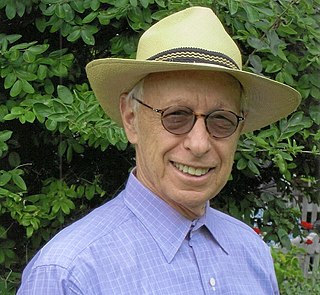
Peter M. Wolf is an American author, land planning and urban policy authority, investment manager, and philanthropist. He lives in New York City.
André Vera (1881–1971) was a French garden designer, town planner and pioneer of the Art Deco style. He is known for his collaboration with his brother, the painter and decorator Paul Vera. He wanted to renew French design, which he felt had been in decline since the 1840s, and to introduce a modern French style that maintained continuity with earlier French tradition. He was an advocate of the formal French garden, with strictly geometrical designs based on lines and squares in place of the curvilinear forms of Art Nouveau. In urban design he stressed the importance of including trees as architectural elements, which he thought would enhance the mental and physical health of the residents.

Marcel César Poëte was a French librarian, historian and urban planning theoretician. He was a co-founder of the School of Advanced Urban Studies, where he taught, and was highly influential in developing new theories of urban planning in Paris in the first half of the 20th century.

Lukasiewicz Christophe was a French architect born in 1933 in Lublin and died in 1999 in Paris.
Unlimited Cities are methods and apps to facilitate the civil society involvement in urban transformations. Unlimited Cities DIY is an Open Source upgrade of the application linked with the New Urban Agenda of the United Nations "Habitat III" Conference.

Olivia Chaumont is a French architect and transgender activist.
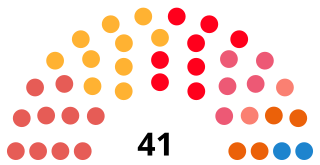
The City Council of Barcelona is the top-tier administrative and governing body of the municipality of Barcelona, Catalonia, Spain. In terms of political structure, it consists of the invested Mayor of Barcelona, currently Ada Colau, the Government Commission, and an elected 41-member deliberative Plenary with scrutiny powers.
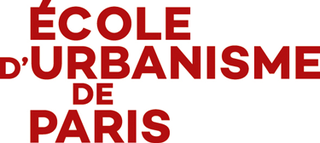
The Paris School of Urban Planning is a higher education and research institute, dependent of both the University of Marne-la-Vallée and the Paris 12 Val de Marne University.

UCLouvain Bruxelles Woluwe, also known as Louvain-en-Woluwe or Alma, is a campus of the University of Louvain in Brussels, Belgium. The campus, built in the 1970s following the Leuven crisis, houses the Faculties of Medicine and Dentistry, Pharmacy and Biomedical Sciences and of Public Health, the Cliniques universitaires Saint-Luc, the university's main academic hospital, as well as many other institutions of higher education and a vast sports complex.
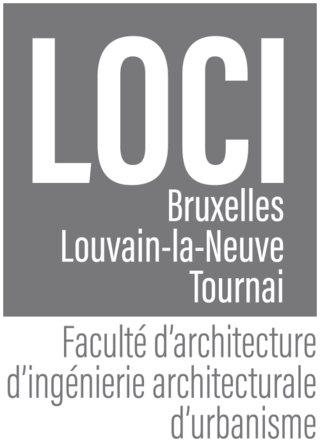
The Faculty of Architecture, Architectural Engineering and Urban Planning, often called LOCI, is the 14th faculty of the University of Louvain, Belgium. It became an independent faculty in 2009, with the merger of three institutes founded between 1867 and 1882, and is active in Brussels (Saint-Gilles), Tournai and Louvain-la-Neuve.














